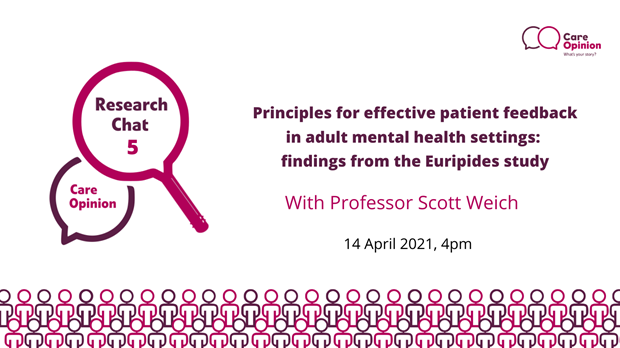
I blogged last year about the findings of the NIHR Euripides Study on "Using patient experience data to support improvements in inpatient mental health care".
At our next Care Opinion research chat, on 14 April at 4pm, we'll be talking to the study lead author Professor Scott Weich about one particular aspect of this study: principles for "how to collect, analyse and use patient experience data to improve the quality of care in adult mental health settings".
The principles were developed and agreed by a stakeholder conference representing a range of perspectives including service users and carers, health service staff, academics and policy makers.
The principles are set out on pages 83-88 of the NIHR report, but I have summarised them here so that they are easy to find and think about ahead of our chat.
It's worth noting that none of these principles are specific to mental health care: all of them could equally well apply to acute, community or primary care.
Theme 1: collecting and giving
Rule C1: always ask about a patient’s experience
Rule C2: make sure you get both positive and negative patient experience feedback
Rule C3: ask for feedback in varied ways at different times
Rule C4: personalised care is valued and the same applies to obtaining feedback
Rule C5: seeing changes based on both positive and negative feedback is important for patients, carers and staff
Rule C6: trusts must engage carers proactively in the inpatient care of the person they care for and staff must communicate to obtain feedback from carers
Theme 2: receiving and listening
Rule R1: staff need protected time to obtain feedback
Rule R2: all staff have a role in receiving, listening to and responding to feedback
Rule R3: staff should be supported to receive feedback
Rule R4: staff need to be able to respond to the feedback that is received
Theme 3: analysis, acting and response
Rule A1: appraisal should include both qualitative and quantitative evidence
Rule A2: informal patient experience feedback must be responded to and used
Rule A3: both positive and negative feedback should be acted on
Rule A4: gathering, analysing and using patient feedback is everyone’s business
Theme 4: implementation, change and quality improvement
Rule ICh1: organisations must have a means of contextualising patient experience and feedback alongside other information gathered
Rule ICh2: service improvement should not be led by negative feedback alone
Rule ICh3: staff need to be engaged in quality improvement
Rule ICh4: quality improvement requires leadership
Do join us at the research chat!
Our research chats are short, informal events, lasting around 30 minutes in all. You can listen to the chat and post questions using the Q&A box during the session.
Register here (free): https://www.crowdcast.io/e/corc-5-scott-weich
User feedback in acute mental health care: making it better
User feedback in acute mental health care: making it better https://careopinionuk-staging.azurewebsites.net/resources/blog-resources/1-images/37ee31d784c84b079a18939848a478f2.png Care Opinion 0114 281 6256 https://www.careopinion.org.uk /content/uk/logos/co-header-logo-2020-default.pngUpdate from Care Opinion
Posted by James Munro, Director of Research & Development, Care Opinion, on
Response from Feedbacker on 14 Apr 2021 at 16:51
I watched the research chat but had technical issues and couldn't say I was there or ask a question. I am a service-user. My question is, 'Who are "staff'? Do 'staff' include psychiatrists? I've filled in so many feedback forms, either for student nurses or for I know not whom (an organisation or body). Do psychiatrists get protected time to give thought to feedback? Do they get feedback? Or is it just nurses who get it?
I'd be interested in any sort of response to my questions.
Response from James Munro, Director of Research & Development, Care Opinion on 15 Apr 2021 at 10:23
Hello Feedbacker, thanks for your questions! I'm sorry you had technical issues.
To view the chat again, if you need to, you can go to the original link:
https://www.crowdcast.io/e/corc-5-scott-weich
We will also bring the recording onto our blog with other chats soon:
https://www.careopinion.org.uk/blogposts/tagged/research-chat
In terms of your specific questions, yes, when we talk of "staff" we (at Care Opinion at least) mean all those clinical and non-clinical staff, including psychiatrists, who have any kind of contact with people using services.
Psychiatrists are required to do some limited patient feedback for revalidation and we did in fact have a previous research chat about this:
https://www.careopinion.org.uk/blogposts/884/research-chat-3-experiencing-psychiatry-do-on
I don't know whether they have protected time to reflect on it, but this is clearly important and is one of the rules referred to by the Euripides study, above. Overall, I believe that the attention given to "data collection" far outweighs the attention given to thinking about what the feedback means and what needs to change, and that is a bad thing.
Response from Feedbacker on 16 Apr 2021 at 08:18
Thanks for your reply. Concerning your last paragraph, I fear the Euripides study will go the same way as feedback itself. The researchers have collected a huge volume of data, and have come up with some 'rules'. I wonder who will take the time to read the full report, think about what the rules mean and what needs to change to put some of the rules into practice.

